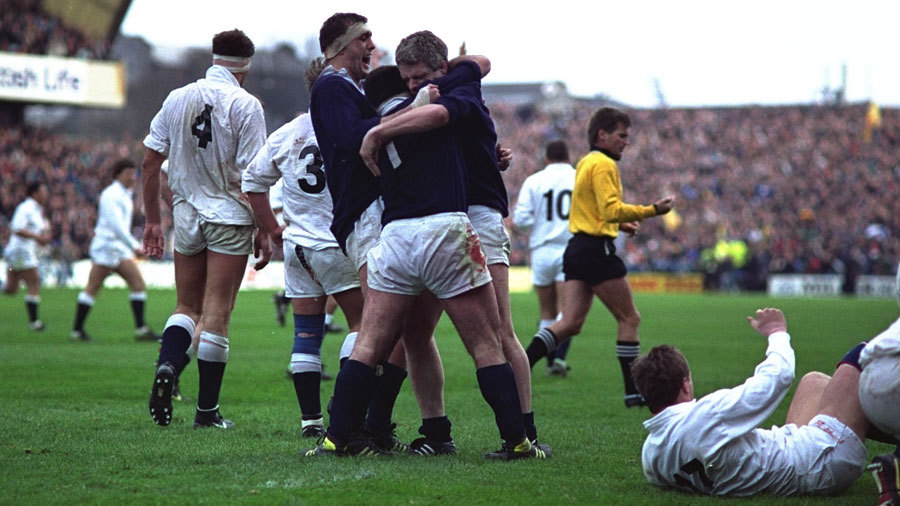March 17 down the years
Proud Edward's Army sent packing
Chris Gray, Finlay Calder and David Sole celebrate Scotland's Grand Slam victory in 1990 © Getty Images
1990
England travelled in expectation and were sent packing as Scotland beat them 13-7 to secure the Grand Slam which most pundits believed would be heading south. The crowd certainly played their part, roaring on the underdogs from the off and making things hard for an ageing England side. The usual moans about the referee followed the game - notably not from England skipper Will Carling who said the Scots deserved the win - but put simply Scotland wanted the win more against a side who arrived with 11 tries and 83 points in their previous three games. Tony Stanger latched onto a chip-kick from Gavin Hastings to touch down for Scotland's only try early in the second half, while Carling came under fire for not kicking four within-range penalties into the wind. Simon Hodgkinson turned down a chance at the first kick and thereafter Carling turned his back on him. "Simon didn't feel confident enough to ask to have a go," he admitted. It remains Scotland's last Grand Slam.
1979
The Decade of the Dragon culminated in Cardiff where Wales won the Triple Crown for the fourth year running, beating a bedraggled England side 27-3, with four of their five tries coming in a virtuoso second-half performance. It was also their 22nd straight Five Nations win at Cardiff. The Welsh Whippet, JJ Williams, signed off for his country with the afternoon's final score while Neil Bennett missed six out of seven kicks for England. JPR Williams, who hobbled off in the second-half, was lifted on the shoulders of supporters at the final whistle as it was believed at the time to be his final match. He returned to the Welsh side 18 months later.
1984
St Patrick's Day is an auspicious date for the Scots, because six years earlier, they were once again victorious in a Grand Slam decider at Murrayfield, this time outmuscling France 21-12. Despite trailing 6-3 at half-time, and then by 9-3 after Jean-Patrick Lescarboura's drop goal, Peter Dods hauled Scotland level before Jim Calder's late try from a line-out provided the decisive moment of the match. It was only the second Grand Slam in Scotland's Five Nations history, and their first since 1925.
2012
Warren Gatland's Wales secured their third Grand Slam in eight years with a 16-9 win over France at the Millennium Stadium. Wales had already overcome Italy and Scotland in Cardiff with wins on the road coming against Ireland and England. Alex Cuthbert scored a first-half try for Wales and the boot of Leigh Halfpenny did enough to guide them over the finishing line. Captain Sam Warburton lifted the trophy - despite being forced to withdraw at half-time with a shoulder injury - and Gethin Jenkins, Ryan Jones and Adam Jones all collected their third Grand Slam. The match had added significance with the death of Mervyn Davies the day before.
2001
A Grand Slam of scoring options for Neil Jenkins, who racked up a try, four conversions, three penalty goals and two dropped goals to spearhead Wales' breathtaking 43-35 Six Nations win in Paris. Jenkins' personal tally accounted for 28 of his team's points, and took him into the history-books as the first player to score more than 1000 in international rugby. Rob Howley, Dafydd James and Scott Quinnell were the other try-scorers.
2007
Super Saturday in the Six Nations began with Ireland, Italy, France and England all in with a chance of winning the title. In the end, France's 46-19 defeat of Scotland gave them the title on points difference over Ireland. England, needing a 57-point margin in the evening match in Cardiff to revive their prospects, were instead beaten 27-18 by Wales.
1972
Hardly earth-shattering in itself but the RFU opened Pandora's Box by approving sponsorship - or as it stuffily referred to it, "the acceptance of financial assistance from commercial firms or individuals". The board imposed strict controls on what was and was not acceptable but as the last major sport to allow sponsorship it had to bow to progress.
1977
Gareth Edwards returned from the World Superstars contest in the United States just in time to take part in Wales's final run-out ahead of the Triple Crown visit to Scotland. His tardiness made no difference - two days later, Wales were triumphant at Murrayfield by 18 points to 9
© Scrum.com


